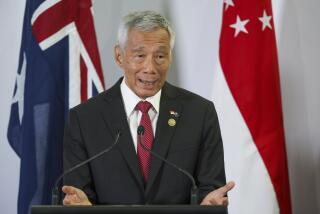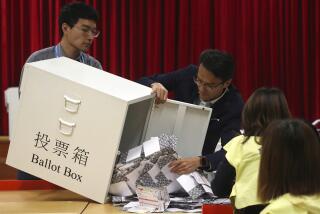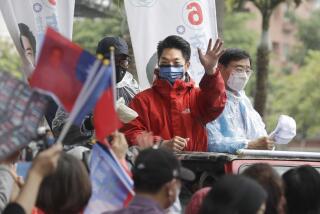New Who’s Who
- Share via
To find the center of power in Hong Kong, one used to look first for a crown. The queen appointed the British governor, who held wide-ranging powers to run the territory, and conferred knighthood on society’s top leaders. Wealth ran a close second in an ambitious city that reveres success.
Now, in an echo of the hand-over slogan, “Hong Kong people running Hong Kong,” the players are changing. The ultimate power lies in Beijing and with those closest to it. And money still counts for a lot.
But in the new Hong Kong, where more people have voted than ever before, integrity counts too. Civil servants committed to fair play in business and government, and pro-democracy legislators are popular public figures.
As Hong Kong redefines itself, these are the people expected to wield influence:
* Anson Chan, 57, chief secretary under British Gov. Chris Patten. Chan, who will stay on as Tung’s deputy, is regarded as the ultimate civil servant and a faithful guardian of Hong Kong’s interests, whether under Britain or China. Despite a long colonial career, her patriotic family background has won her favor in Beijing.
* Donald Tsang, 52, finance secretary. Outspoken and unpopular with Beijing, the bow-tied Tsang is a man of integrity and an anchor of the civil service. He oversees Hong Kong’s budget. Hong Kong watchers would regard the early retirement of Tsang or Chan as a signal that Beijing is not keeping its hands-off promises.
* Andrew Li Kwok-nang 48, chief justice. Li’s appointment was a reassuring move to those who had concerns about the independence of the judiciary after the hand-over. Li, a member of a prominent Hong Kong family, was educated in England and is widely recognized for his impartiality. He will oversee the formation of the Court of Final Appeal, Hong Kong’s equivalent of the Supreme Court.
* Leung Chun-ying, 42, property tycoon. Leung will be on Tung’s Executive Council and has been charged with revamping Hong Kong’s troubled housing program--a key policy issue. Critics say his appointment is a conflict of interest, but he is trusted by both Tung and Beijing. A longtime patriot and popular businessman, Leung is a likely successor to Tung.
* Paul Yip Kwok-wah, 53, special advisor to Tung. Yip is considered a behind-the-scenes power broker. Close to Beijing’s leadership, especially President Jiang Zemin, but also an advocate of a liberal democratic government for Hong Kong, Yip may become the mediator if interests clash.
* Martin Lee, 60, chairman of the Democratic Party, the party that is the largest and most popular in Hong Kong but least favored by Beijing. Lee, a lawyer, will lead legal challenges against the Beijing-appointed Provisional Legislature, which will supplant Hong Kong’s elected body after the hand-over. Lee will claim the appointed legislature is unconstitutional. Tung has accused Lee of “bad-mouthing” Hong Kong during fund-raising trips abroad.
* Christine Loh, 41, independent legislator. Loh has formed the new Citizens’ Party, a liberal democratic group that wants to cooperate with China rather than confront it. The party may attract voters who think the Democrats will be disregarded by Beijing.
* Emily Lau, 45, legislator and founder of the pro-democracy Frontier Party. Lau--a former journalist--is one of the most outspoken defenders of Hong Kong’s freedoms and an opponent the incoming government finds irksome. Lau was arrested last year for blocking traffic with the party’s mock funeral for “the death of democracy,” staged during the selection of Tung as chief executive. How Tung’s office handles her will be a barometer of its tolerance for political dissent.
* Larry Yung Chi-kin, 55, chairman of China’s top state-owned investment conglomerate, CITIC Pacific, and son of Chinese Vice President Rong Yiren. Yung, a Stanford-educated engineer, is known in Hong Kong as the “Red Capitalist.” He recently obtained holdings in strategic telecommunications and airline companies, and earned a $400-million bonus in a corporate restructuring. Yung is bold enough to warn China to keep its hands off Hong Kong--and he has the clout to get away with it.
* Li Ka-shing, 68, real estate mogul. In Hong Kong’s version of the American Dream, Li went from selling plastic flowers to multibillionaire. He gave quiet backing to Tung as chief executive and donated the site and project management for the Chinese Foreign Ministry’s new Hong Kong headquarters.
* Raymond Chien Kuo-fung, 44, industrialist. Chien will glide from Patten’s Cabinet to Tung’s after the hand-over, but he must give up his British passport. Chien thinks Beijing should help Hong Kong transform itself into an Asian Silicon Valley. This idea has drawn fire from those who don’t want tinkering with the territory’s hands-off system.
More to Read
Sign up for Essential California
The most important California stories and recommendations in your inbox every morning.
You may occasionally receive promotional content from the Los Angeles Times.










